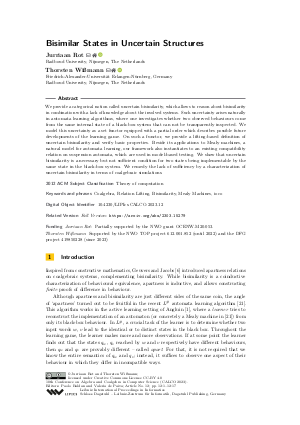Bisimilar States in Uncertain Structures
Authors
Jurriaan Rot  ,
Thorsten Wißmann
,
Thorsten Wißmann 
-
Part of:
Volume:
10th Conference on Algebra and Coalgebra in Computer Science (CALCO 2023)
Part of: Series: Leibniz International Proceedings in Informatics (LIPIcs)
Part of: Conference: Conference on Algebra and Coalgebra in Computer Science (CALCO) - License:
 Creative Commons Attribution 4.0 International license
Creative Commons Attribution 4.0 International license
- Publication Date: 2023-09-02
File

PDF
LIPIcs.CALCO.2023.12.pdf
- Filesize: 0.74 MB
- 17 pages
Document Identifiers
Related Versions
- Full Version https://arxiv.org/abs/2303.15279
Subject Classification
ACM Subject Classification
- Theory of computation
Keywords
- Coalgebra
- Relation Lifting
- Bisimilarity
- Mealy Machines
- ioco
Metrics
- Access Statistics
-
Total Accesses (updated on a weekly basis)
0Document
0Metadata
Abstract
We provide a categorical notion called uncertain bisimilarity, which allows to reason about bisimilarity in combination with a lack of knowledge about the involved systems. Such uncertainty arises naturally in automata learning algorithms, where one investigates whether two observed behaviours come from the same internal state of a black-box system that can not be transparently inspected. We model this uncertainty as a set functor equipped with a partial order which describes possible future developments of the learning game. On such a functor, we provide a lifting-based definition of uncertain bisimilarity and verify basic properties. Beside its applications to Mealy machines, a natural model for automata learning, our framework also instantiates to an existing compatibility relation on suspension automata, which are used in model-based testing. We show that uncertain bisimilarity is a necessary but not sufficient condition for two states being implementable by the same state in the black-box system. We remedy the lack of sufficiency by a characterization of uncertain bisimilarity in terms of coalgebraic simulations.
Cite As Get BibTex
Jurriaan Rot and Thorsten Wißmann. Bisimilar States in Uncertain Structures. In 10th Conference on Algebra and Coalgebra in Computer Science (CALCO 2023). Leibniz International Proceedings in Informatics (LIPIcs), Volume 270, pp. 12:1-12:17, Schloss Dagstuhl – Leibniz-Zentrum für Informatik (2023)
https://doi.org/10.4230/LIPIcs.CALCO.2023.12
BibTex
@InProceedings{rot_et_al:LIPIcs.CALCO.2023.12,
author = {Rot, Jurriaan and Wi{\ss}mann, Thorsten},
title = {{Bisimilar States in Uncertain Structures}},
booktitle = {10th Conference on Algebra and Coalgebra in Computer Science (CALCO 2023)},
pages = {12:1--12:17},
series = {Leibniz International Proceedings in Informatics (LIPIcs)},
ISBN = {978-3-95977-287-7},
ISSN = {1868-8969},
year = {2023},
volume = {270},
editor = {Baldan, Paolo and de Paiva, Valeria},
publisher = {Schloss Dagstuhl -- Leibniz-Zentrum f{\"u}r Informatik},
address = {Dagstuhl, Germany},
URL = {https://drops.dagstuhl.de/entities/document/10.4230/LIPIcs.CALCO.2023.12},
URN = {urn:nbn:de:0030-drops-188094},
doi = {10.4230/LIPIcs.CALCO.2023.12},
annote = {Keywords: Coalgebra, Relation Lifting, Bisimilarity, Mealy Machines, ioco}
}
Author Details
Funding
- Rot, Jurriaan: Partially supported by the NWO grant OCENW.M20.053.
- Wißmann, Thorsten: Supported by the NWO TOP project 612.001.852 (until 2022) and the DFG project 419850228 (since 2023)
References
-
Dana Angluin. Learning regular sets from queries and counterexamples. Inf. Comput., 75(2):87-106, 1987.

-
Simone Barlocco, Clemens Kupke, and Jurriaan Rot. Coalgebra learning via duality. In FoSSaCS, volume 11425 of Lecture Notes in Computer Science, pages 62-79. Springer, 2019.

-
Filippo Bonchi, Daniela Petrisan, Damien Pous, and Jurriaan Rot. A general account of coinduction up-to. Acta Informatica, 54(2):127-190, 2017.

-
Thomas Colcombet, Daniela Petrisan, and Riccardo Stabile. Learning automata and transducers: A categorical approach. In CSL, volume 183 of LIPIcs, pages 15:1-15:17. Schloss Dagstuhl - Leibniz-Zentrum für Informatik, 2021.

- Marcelo P. Fiore. A coinduction principle for recursive data types based on bisimulation. Inf. Comput., 127(2):186-198, 1996. URL: https://doi.org/10.1006/inco.1996.0058.
- Herman Geuvers and Bart Jacobs. Relating apartness and bisimulation. Logical Methods in Computer Science, Volume 17, Issue 3, July 2021. URL: https://doi.org/10.46298/lmcs-17(3:15)2021.
-
Gerco van Heerdt. CALF: Categorical Automata Learning Framework. Phd thesis, University College London, October 2020.

-
Claudio Hermida and Bart Jacobs. Structural induction and coinduction in a fibrational setting. Inf. Comput., 145(2):107-152, 1998.

-
Jesse Hughes and Bart Jacobs. Simulations in coalgebra. Theor. Comput. Sci., 327(1-2):71-108, 2004.

-
Bart Jacobs. Categorical Logic and Type Theory. Number 141 in Studies in Logic and the Foundations of Mathematics. North Holland, Amsterdam, 1999.

-
Bart Jacobs. Introduction to Coalgebra: Towards Mathematics of States and Observation, volume 59 of Cambridge Tracts in Theoretical Computer Science. Cambridge University Press, 2016.

- André Joyal, Mogens Nielsen, and Glynn Winskel. Bisimulation from Open Maps. Information and Computation, 127:164-185, 1996. URL: https://doi.org/10.1006/inco.1996.0057.
-
Clemens Kupke and Dirk Pattinson. Coalgebraic semantics of modal logics: An overview. Theor. Comput. Sci., 412(38):5070-5094, 2011.

-
Clemens Kupke and Jurriaan Rot. Expressive logics for coinductive predicates. Log. Methods Comput. Sci., 17(4), 2021.

-
Paul Blain Levy. Similarity quotients as final coalgebras. In FoSSaCS, volume 6604 of Lecture Notes in Computer Science, pages 27-41. Springer, 2011.

-
Davide Sangiorgi. An introduction to Bisimulation and Coinduction. Cambridge University Press, 2012.

-
Lutz Schröder. Expressivity of coalgebraic modal logic: The limits and beyond. Theor. Comput. Sci., 390(2-3):230-247, 2008.

-
Sam Staton. Relating coalgebraic notions of bisimulation. Log. Methods Comput. Sci., 7(1), 2011.

- Jan Tretmans. Model based testing with labelled transition systems. In Robert M. Hierons, Jonathan P. Bowen, and Mark Harman, editors, Formal Methods and Testing, An Outcome of the FORTEST Network, Revised Selected Papers, volume 4949 of Lecture Notes in Computer Science, pages 1-38. Springer, 2008. URL: https://doi.org/10.1007/978-3-540-78917-8_1.
-
Henning Urbat and Lutz Schröder. Automata learning: An algebraic approach. In LICS, pages 900-914. ACM, 2020.

-
Frits Vaandrager, Bharat Garhewal, Jurriaan Rot, and Thorsten Wißmann. A new approach for active automata learning based on apartness. In Tools and Algorithms for the Construction and Analysis of Systems - 28th International Conference, TACAS 2022, Lecture Notes in Computer Science. Springer, April 2022.

- Petra van den Bos, Ramon Janssen, and Joshua Moerman. n-complete test suites for IOCO. Softw. Qual. J., 27(2):563-588, 2019. URL: https://doi.org/10.1007/s11219-018-9422-x.
- Thorsten Wißmann, Jérémy Dubut, Shin-ya Katsumata, and Ichiro Hasuo. Path category for free. In Mikołaj Bojańczyk and Alex Simpson, editors, FoSSaCS 2019, pages 523-540, Cham, April 2019. Springer International Publishing. URL: https://doi.org/10.1007/978-3-030-17127-8_30.
